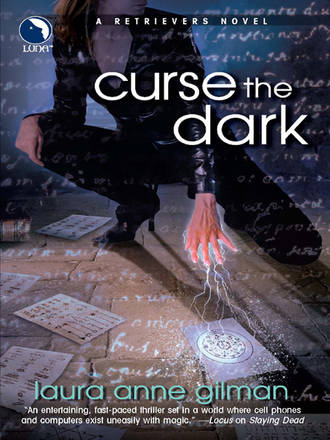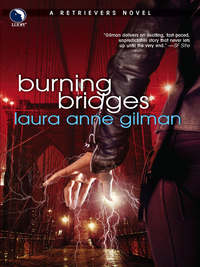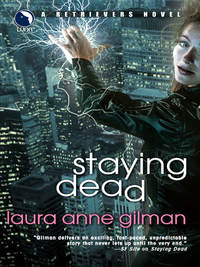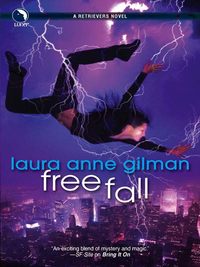
Полная версия
Curse the Dark
He took the cup from her, and threw it out with his own, then looked around to take his bearings.
“This way,” he said finally, leading her to the elevator, down two floors and then through a covered walkway to where the car rental offices were. “Stay put,” he told her, depositing her in the corner with their luggage. “If I remember anything about Italian bureaucracies, this will take forever.”
However, his expectations were unfulfilled, and the registration went smoothly enough. He collected Wren and the luggage, and they found their way without too many problems to the car assigned to them. He unlocked the doors, then did a double-take. “Damn. I had forgotten about that.”
“Forgotten about what?” Wren dropped her carry-on into the back seat of the battered, dark blue sedan and looked at him. “BMW. Sweet.”
“They’re like Chevrolet over here, don’t get too excited. And I haven’t driven overseas in so long I forgot to request an automatic transmission.”
Wren’s brow creased, and she reached up to tug at the short braid she’d gathered her hair into at some point. “I can’t drive stick,” she admitted.
“I can. But it’s been…a while.”
“Oh boy,” was his partner’s only comment as she got into the passenger seat and strapped the safety belt on. “Oh boy.”
Chapter Five
The drive from Malpensa to the monastery in the hills just north of Siena took five hours, most of it on an endless winding highway where driving under one hundred and sixty kilometers per hour got you flashed lights and eloquent hand gestures as they zoomed past. Finally Sergei had gotten the hang of changing gears, and they’d moved up to speed themselves.
“So how does the Silence end up with this gig, anyway?” Wren asked, more out of idle curiosity than anything else. “Do they hand out flyers on street corners? ‘Lose something magical? Call us!’ Hey, there’s an idea. Maybe—”
“Nothing quite so crassly commercial,” Sergei said, cutting that bad idea off at the knees while shifting to pass a double-axle truck going one hundred kph. “The Silence is a watchdog organization, for the most part. Think of it as analogous to the United Nations.”
“Yeah, so you’ve said before. ‘Always on the lookout for things gone wrong to set right,’ like the Marines meet Quantum Leap.”
“I never said that.”
“Close enough. But what you never said was how the Marines got called.”
“Networking, mostly. ‘Someone knew someone who was helped in that sort of situation, let me put in a call’ kind of thing. And then they parcel out the assignments, based on who has the best skills to handle it.”
“And how many of those someones are actually Silence employees?”
“Cynical woman. Not as many as you would think. The Silence does do good work. The fact that the rest of the world hasn’t imploded yet, from means magical and otherwise, is proof of that.”
Privately, Wren thought her partner was still showing signs of Silence brainwashing. But saying that would probably be poking the bear with the grumpy stick. Fun, sure, but ultimately a bad idea.
“So. Where are we going, anyway?” she asked, in order to move the conversation on.
“A small town in Umbria called…something or another in Italian. The monastery where the object was kept is there. We’ll take a look around, see what you can pick up, and go from there. Okay?”
He was making plans without her. Normally that would lead to some harsh words—she was the Retriever, not him, and she knew what needed to be done—but the need for a nap was winning over the planning portion of her brain, and the yawn she could feel coming on overruled anything else. For now.
“Yeah. Okay.”
The rest of the trip was a blur, to her, of speeding cars, rolling green and yellow hills, and Sergei’s muttered curses forming a melody that finally sent her off into dreamland.
“We’re here.”
Wren opened her eyes to afternoon sunlight bathing her vision with a soft golden tinge. She got out of the car and stretched, then looked around. “Sorry, didn’t mean to sleep all the way.” She paused. “Where are we?” The car was parked on a small patch of gravel surrounded on three sides by tall, narrow trees. It all looked the part of a scenic destination, but the low stone building on the rise of hill behind them didn’t look like any hotel she’d ever stayed at before. She sniffed the air. It was fresh, clean, filled with allergens, and…off, somehow. She sniffed again. No, just your ordinary fresh air. Then why was there this weird trickle of unease down her spine? Jet lag. Italian coffee. Could be anything. Where the hell are we? “Sergei…”
He reached into the back seat for his jacket, but didn’t put it on right away. The expression on his face was one she knew all too well: him about to try and talk her into a job that he knew she wasn’t going to like. Except that they were already on a job she didn’t like. “I thought it might be a good idea to stop in and let the monks know that we’re here.”
Wren thought of a few particularly good comebacks, but settled for an unhappy grunt. She had fallen asleep and left the driving to him. That put him in the decision-making seat, and his instincts were pretty damn good about stuff like this. Even if she was still in dire need of that shower and a candy bar.
“Besides…” He looked down at the view, but his attention was clearly elsewhere. The breeze ruffled his hair slightly, and made her wish she were wearing a long-sleeved shirt for the first time in weeks.
“Besides?” she prompted him.
“It’s nothing. I just wanted to get started, is all.”
“You sure they’re going to want drop-in visitors?” she asked mildly. “I mean, monastery, monks, isolation, etcetera, right?”
“We’re hardly unexpected. And I don’t think it’s a cloistered monastery in the way you’re thinking—according to the sign we passed on the way up, they have a gift shop.”
“Oooookay….” For some reason, Wren had the sudden visual of pasta in the shape of the Crucifixion, with red sauce, and shook her head violently until the image was gone. She was already probably going to Hell, but why make it even worse? “But monks and prayers and bell-tolling, right?”
“Indeed. And we even wear robes occasionally.” They both spun around to see a middle-aged man in a pale grey robe that should have looked silly but didn’t, standing in the grass to the side of the parking area, smiling at them. “Forgive me. I heard the car coming up the hill and came down to see who it could be. I am Brother Teodosio. And you, obviously, are our visitors from the States.”
“Sergei Didier,” Sergei’s hand was engulfed in the other man’s. They were about the same height, but Teodosio had at least fifty pounds on him, and very little of it was muscle. His face was round, but not jolly, and Wren didn’t think many people challenged him twice.
“Wren Valere,” she said, and had her own hand swallowed in turn. His skin was warm, and a little moist, but nothing unpleasant. His eyes were surprisingly blue, under the black hair peppering into grey, and Wren noted that he didn’t have a tonsure like she’d always thought was required style for monks.
And he’s wearing jeans under that robe. And sneakers. Another fine myth shot to…okay, maybe not hell, for a monk.
“I hope that your drive down was a pleasant one. Welcome to the Sienese, and specifically to I Monaci delle Sante Parole—better known to some as the House of Legend.”
“House of…?” Sergei’s ears practically perked up, probably hoping it had something to do with artwork he could cart back home and make a nice chunk of change on the side.
“Legend.” Teodosio’s attention went back to Sergei, promptly dismissing—forgetting about—Wren. That was a side effect of her particular blend of skills, and part of what made her so effective. And why her mentor, Neezer, had nicknamed her Jenny-wren. Because nobody ever saw the small brown bird—but she saw them.
“Indeed,” the monk continued, “as with any building over a century or two old, there are stories attached to it. And the House is quite old, indeed. It is our heritage, our reason for being here. And, indeed, the reason for your being here as well, sadly.”
“As to that—my information said that you would be able to fill us in on the specifics?”
“You were not told?” The monk seemed taken aback by that, then shrugged as though asking why the works of man should be any less obscure than the works of God.
“To understand, you must first understand who we are, and what we do here. The story is—” and he made a gesture to indicate that they should walk with him along the path Wren now saw leading through the field and up the rise to the building she had noted earlier “—that in the early years of the thirteenth century, four monks came north, fleeing the aftermath of one or another of the endless squabbles between the city-states and the papacy.”
Sergei fell easily into step beside their guide, leaving Wren to take up position behind them on the path.
“Their abbey had been destroyed?” Sergei was in smooth mode, she noted. She kept her ears open and took mental notes, in case anything seemed relevant—or might become so, later on.
“They kept no records of where they came from—we don’t even know their names, as they simply referred to themselves as, how would it translate?” He shook his head as though searching for something inside. “As ‘the brothers of the gathering word’? Close enough. And that is the assumption, yes. Destroyed, or taken as spoils of victory by whichever princeling had control of that town on that particular month.”
Sergei was nodding, drawing the monk on to tell the rest of the story.
“With them, so the story goes, they had little money, no supplies, and two chests filled with manuscripts they had taken from their abbey when they fled. That, we assume, is why they took the name they did, referring to the gathering of the manuscripts into a library of sorts. They arrived here, and with the permission of the local Ghibelline nobility and the local bishop, built the House first, not for their own protection, but for the books they carried with them. And so it has been ever since; we are the caretakers of learning, of the wisdom established by those who have come before us.”
“Librarians, you mean.”
Rather than looking offended, Teodosio smiled and nodded. “Exactly.”
Somehow Wren doubted that it had been anywhere near as simple or neatly tied up as that. From what little she knew of history, the rivalries he mentioned had been pretty nasty, and making an alliance with the wrong person could be deadly. So what had those four monks offered the local bishop that he gave them—homeless, with no money or military strength—permission to build their own independent housing on what looked like some seriously prime property? Sergei’s notes said, for all they were Catholic monks in name, there wasn’t any direct control of the order from Rome. She was just a nice lapsed Protestant girl, but that seemed really odd to her. Wasn’t there a whole chain of command thing, orders of obedience, ad extreme nauseum?
She made a mental note to follow up on that particular question, when she had time. It might be nothing—or it could be everything. You never knew.
They came around a bend in the path, and were on a cliff overlooking a valley town that could have come out of a tourist’s guide.
“Wow,” Wren said, taking a step closer to the edge. Absolutely prime property, yeah. You could see for miles, the horizon a smudge of sun-yellowed fields intersected by the occasional ribbon of black road and dotted by random buildings that were probably either barns or farmhouses.
“Indeed. It reminds one of the glory around us, every morning, when I come out here.”
Not to mention being totally defensible, Wren thought, casting a look over her shoulder to where the low stone building was revealed to be a more elaborate structure than it had first appeared. Yeah, red stone fortresslike building put on the top of a hill, near a cliff, sure they’d just hand that view over to a couple of rabbitting monks, no questions asked, out of the goodness and charity in their hearts.
Wren didn’t much believe in the goodness of anyone’s heart. Not without references.
“You speak excellent English,” Sergei said finally.
Teodosio laughed. “I went to university in Boston,” he said. “M.I.T. I thought I was going to be a mathematician, but God had other plans for my curiosity.” Wren looked away from the view at that, but his face seemed as serenely unlined as before.
“Come, you’ll want to visit the room where the manuscript was taken from, and see what you may see, yes?”
“Yes, please,” Sergei said, shooting Wren a warning glance. She returned it with a look of wide-eyed innocence. They had played out variations of this scenario before. The big, well-dressed man would take the lead, asking the questions and hogging the attention. After a few more carefully smart but not too imaginative questions, Wren would start to fade from their awareness, leaving her free to do the real looking around. Not that there was much to see.
“The building to your left is our dormitory.” It looked like a traditional rustic farmhouse; three stories high with wide windows framed by wooden shutters, two grey chimneys, one on either end; and faced entirely of the same brick used in the larger building. But something about it said modern construction, without being obvious about it. A carefully tended garden ran the entire length of the left side, filled with tall green leafy things and splashes of red and yellow that Wren couldn’t identify. Vegetables came from the supermarket, usually wrapped in plastic. She didn’t think about it much beyond that. It was surprisingly quiet, just the sounds of birds and wind, and the occasional low thump and murmur, like someone moving something somewhere else. Her skin prickled uneasily.
Two men came out of the front door, talking in low voices to each other. They were dressed in plain brown trousers and button-down shirts rather than Theo’s robe, but their postures were more hunched over, more defensive. They caught sight of the newcomers, and froze.
“Ah, just who I wanted to see,” Teodosio said. If he wanted to see them, they clearly had not wanted to see Teodosio. Although it might have been the Americans they were reacting to, the way the duo scuttled around to the other side as they approached.
“Brothers Alain and Frederich. This is Signor Didier, from the States, and his associate, Signorina Valere. They work with Signor Mattenni and are here representing the signor’s interests.”
Wren kept a straight face, and managed not to shoot her partner a glance. She supposed that name would have come up in the briefing their no-show contact would have given them, because there had been no Mattenni mentioned anywhere in the quickie briefing they got before leaving, including all the paperwork Sergei was hauling around.
Or maybe they hadn’t planned on giving them that particular info at all.
Gee, Silence information not up-to-date or fully accessible. The shock. Sergei was right, their motto really is know all, tell nothing. Even to their own people.
“Alain, if you would inform Jacob that our guests are here?” Brother Alain made a hunched-forward gesture that looked like it started out as a bow, and ran back into the farmhouse. “Frederich, come with me, please.”
Frederich looked even less happy than before, but obediently fell into step with them as they continued toward the larger building.
Now that she was on a level with it, the structure looked even more like a fortress than before—a rectangular shape, two stories high, with narrowly arched windows at odds with the larger, square openings of the farmhouse-dormitory. The facade was arched, and the double-door opening could have taken a full-size Cadillac and not scratched the chrome on either side. In the afternoon sunlight, it glowed against the summer-blue sky, like something out of one of those paintings, the ones where it always looked as though it were about to thunder. Hudson Valley school, right. She had retrieved one back in, what, ’97?
Teodosio led them right up to the doors and unlocked the left-hand door with an old-fashioned metal key. “Any time you wish to enter the House, either I or Frederich must be with you. We have many treasures within these walls, you must understand, and we are the entrusted caretakers of them.”
“Of course,” Sergei said politely. Personally, Wren figured the lock would take her about seven seconds to tumble, even without using current. And there didn’t seem to be any other kind of security, no alarms or tripwires or—
The doors closed behind them, and Wren felt herself shiver not from the sudden dark, or the echoing quiet, but from the fact that she knew, instantly, that she was inside a building with absolutely no electrical wiring at all. The walls were thick brick and mortar, and insulated to a fare-thee-well. Current could not find her there.
She could not find current here.
The uneasy prickle turned into full-fledged worry, just one small step down from panic, and she touched the magic inside her, warming suddenly-cold nerves on the responsive flickers deep in her core.
“Wren?” Sergei cast a concerned look sideways, obviously having sensed her reaction.
“I’m fine.” She wasn’t, not by a long shot, but couldn’t let it throw her. What she was going to do now was seriously low-power anyway; even as tired as she was, it would barely disturb her natural level of current. And if anything happened, well, she’d been told there were ways to get current from stone, if you needed it badly enough. And there was a lot of stone around her that had likely never been tapped, if the building was as old as it looked. As old as Brother whatsisname, Teodosio, said it was.
“If you will come with me, please.” Teodosio turned a knob on the wall, and the gas lamps placed along the main hallway flared brighter. “I apologize for our old-fashioned ways of doing things. We try to remain true to our traditions. And besides—” a brief smile flashed on his basset hound face “—the money is not there to upgrade.”
He was lying. Wren didn’t know how she knew that, but he was. Which meant they had a reason for not having electricity available. Old-fashioned? Or cutting a Talent off from an easy source of energy? Don’t get paranoid, Valere. Not yet. Not while you’re still gathering information.
They went up a shallow stone staircase, ten steps, then a landing, then turned and another ten steps to the second floor. The torches seemed brighter up here, or somehow more light was getting through the narrow windows, because Wren could see more details around her. The walls had been plastered over with a slightly rough-textured white coating, and the wooden beams of the ceiling were blackened with age, creating a pleasing contrast. At intervals along the walls there were alcoves holding wooden carvings of figures—saints, she supposed—in various benevolent poses. Wren, with her lapsed Protestant background, didn’t have a clue who any of them were. Her mother might have. Sergei probably did.
There were five doorways on either side of the hallway, each arched in a smaller echo of the main entrance. Passing by several of them, Wren caught a glimpse of glass-fronted cases and heavy cabinets. It wasn’t so much a library, she thought, as a book prison….
“In here, please.”
They were ushered through a doorway on the left, into a room that seemed incandescent compared to the gloom of the hallway. Light came in through the windows, split into prisms by the leaded glass. There were a number of the heavy cabinets here as well, plus thick glass-topped desks with obviously old manuscripts displayed underneath. One of them was conspicuously empty, the faded green backing noticeably darker where something had been removed.
“It was there?” Sergei asked, pointing to the empty space.
“What? Oh, no, no. That is an illuminated manuscript we’ve out on loan to a brother organization. The Nescanni parchment, that was never left on display, no. No, never that.” Teodosio was flustered, far beyond what the question would seem to merit, until Wren remembered what Andre had said. Everyone who has read it has disappeared. Right. Displaying it where anyone could lean over and take a looksee…not such a good idea, no. Although the way he’s reacting, I bet that’s exactly what they did once. Wonder who went and disappeared? And how long ago?
“How did you even know it was gone?” Wren spoke without thinking, earning her a sharp glance from everyone, Sergei because she wasn’t supposed to be talking, the two monks because they had almost forgotten she was there. In for a penny… “If nobody ever read it, how did you know it was gone?”
“Ah. The parchment was bound between two sheets of slate, like a sandwich. We would check the edges every six months, to ensure that there was no water or spore damage to it, as we do all of our charges. At the most recent check three weeks ago, the young brother whose assignment it was sensed something wrong and opened the slate perhaps a bit more than was wise. Fortunately for him, the paper that had been left in the manuscript’s place did not have the same effect on him as the original would have.”
“He’s still around, then?”
“Oh, yes. You will wish to speak with him?”
“Please.” Seemingly taking back control of the situation, Sergei turned to Wren with the air of someone used to delegating. “Stay here, look around, learn whatever you can. I will meet with the young man and see what he has to say.” Wren—recognizing the voice he used with Lowell, his gallery associate when the well-bred wonder got a shade too uppity—had to make an effort to keep a straight face as she nodded her understanding of her assignment. An assignment that was exactly what she had planned to do, anyway, had she been scouting the scene on her own.
Teodosio and Sergei exited, leaving Wren alone with Frederich, who looked as though he’d still rather be anywhere else, although that expression had been softened a little by boredom.
What had boyo been expecting? Clearly they were told we would be coming, but what exactly were they told they’d be getting? That was a valid question—Teodosio had not specified the Silence, and Sergei told her that more often than not their operatives worked totally detached from the main organization, so you could be working for them through a series of—what had Sergei called them? Cutouts, that was it. You could be working through cutouts and never know who was actually footing the bill. If that was the case here, then this Mattenni might not have said anything more than “two Americans coming, give them assistance.” Or he might have told them exactly what she was, and what she did.
Not knowing limited her options considerably. They had agreed, on the flight over, to keep Wren’s status as low-profile as possible. Especially since the Catholic Church—Rome just down the block, as it were—was still a little hinky about the whole magic thing. The Holy See could be awfully touchy about anyone using current on their turf, sans dispensation. Without knowing if this particular little subsect was Cosa friendly or not, she’d have to be totally closeted.
Moving over to the cabinet where Teodosio said the missing manuscript had been stored, Wren looked over at Frederich for permission, then slid the drawer open. It was shallow, maybe two or three inches deep, and the wood had been polished until it gleamed with the patina only really old, well-used furniture got. She took a deep breath, feeling for the stone around her. Normally she preferred to ground on wood or earth, more familiar, human-friendly bases, but she was focusing on something made of wood, so that wouldn’t work as well.
Cool, firm, solid…. Standing in place, forever and yesterday….
She had been right, there was a faint trickle of current in the stones, but it was deep and buried and sleeping. She left it alone. Satisfied that her body was settled, Wren reached down into her core, pushing a mental hand down and coaxing up one vivid blue tendril. It climbed up into her arm, pulsing with raw possibility.







